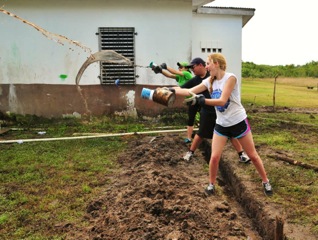Students Belize in Service

Students focused on services that related to farming, including digging trenches for fences and mixing concrete by hand.
Over winter break, the Office of Community Service and Religious Life took 13 students and two administrators to Belize to participate in service through Peaceworks.
Rev. Donna Hughes, Director of Community Service and Religious Life, led the trip with student co-leaders Jamie Leidwinger ’15 and Faith Jiyeong Park ’14. The winter break trip has consistently occurred abroad, and Hughes does not see that changing. She said, “My goal is to go every winter break.” She continued to say they would like to have “an international trip over spring break to some place like Belize, that’s close, for a week to 10 days.”
Students have different reaction to service trips, but Hughes hopes they take away one viable lesson. “My hope is that students learn what it means to do service. That means that you work along side someone else that you listen to what someone’s needs are, and then you work along side them,” said Hughes.
A large part of international service trips is to have students learn about the culture. Hughes highlighted the importance of culture, as she said, “I want students to understand other cultures, and we generally go into the two-thirds world, so it’s an opportunity to see poverty in other countries.”
Jessica Hampton ’17 took a piece of Belizean culture back home. “I think the cultural exchange that inevitably accompanies a trip like this really opened my eyes to what truly matters in life. One of the people we worked with, Dionne, would always tell us to get things done “today today,” not tomorrow. While he was usually referring to mixing concrete, through our group reflections that phrase became a sort of reminder to us all to not focus too much of our time on where we hope to be in the future and the exact path we want to take to get there,” she said.
The group did a multitude of tasks in Belize ranging from digging a trench for a fence to beautification. Leidwinger provided details on these tasks, which relate to an emphasis on farming. “We dug trenches for a chain-link fence, we mixed concrete by hand – which meant eight buckets sand, three buckets of water and one bag of concrete – with shovels, no cement mixer,” she said. Leidwinger continued to detail their experiences with Double Head Cabbage, the primary school where Dickinson students conducted their work. “The second week we split into four groups – there are four groups in the district – Double Head Cabbage had 83 students, there are about 200 students in the district, and then we did beautification opportunity for all students to learn about the connections between multiple faiths and service [….] outside the classroom,” a new interfaith service trip is being offered. The Detroit interfaith trip, which partners with the organization Repair the World, will provide an opportunity for students to explore various faiths in the context of service, although applicants are not required to be religious. According to the student leaders, the concepts behind the work planned for the trip may include education inequality, youth development and hunger and food issues.
In their experience, the student leaders found that Dickinson’s service trips focus on engaging a community in a meaningful way—for example, working with future residents to care for a house, rather than simply building it and leaving—because the trips return to the same communities over several years.
Teambuilding and reflection is also important. Each team consists of approximately 11 students at a ratio of three new members, one person with service trip experience, two student leaders and two staff or faculty administrators. In the weeks before departure and every day on site, the teams meet for debriefings and discussions that range from the practical to “deep questions,” as Serra put it. She says, “There really is no better way to learn about yourself, or learn about others,” than through these trips.
Students interested in applying should know that applications are due on Friday, January 30 at 4 p.m. by email to [email protected], or delivered to Landis House. The participation fee is $200, and some scholarships are available to those who are eligible. Group interviews will occur from February 3-5 and decisions will be announced on February 6. Participants will meet with their teams and organize fundraisers to cover the rest of the cost.
The Office of Community Service and Religious Life wishes to prioritize the spring break trips until teams are finalized; more information about the New York City and New Mexico/Arizona trips will be forthcoming in March.





